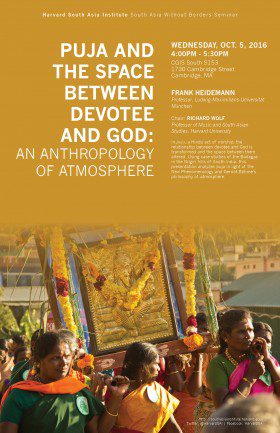South Asia Without Borders Seminar
Frank Heidemann, Professor, Ludwig-Maximilians-Universität München
Chair: Richard Wolf, Professor of Music and South Asian Studies, Harvard University
In puja, a Hindu act of worship, the relationship between devotee and God is transformed and the space between them altered. Using case studies of the Badagas in the Nilgiri hills of South India, this presentation analyzes puja in light of the New Phenomenology and Gernot Böhme’s philosophy of atmosphere.
Atmosphere, according to Böhme, is the quality of a surrounding space, as perceived by all the senses and the felt body (Leib). It is an intersubjective, fluid, dynamic totality: a total social fact. The perceiving persons are co-producers and part of the atmosphere, but they consider it an external, “half thing” (Halbding). Atmospheres create social realities, contextual norms, and have an impact on the emotional state of individuals. Every society has specialists who strategically construct and monitor the process of creating atmospheres. Puja and other activities of priests produce particular religious atmospheres and contribute to a shared emotional state among devotees. In other contexts atmospheres contribute to what Heidemann calls “social proprioception.” He argue for an anthropology of atmosphere that investigates the production and perception of social atmospheres and their ontologies.
Cosponsored with the Department of South Asian Studies

